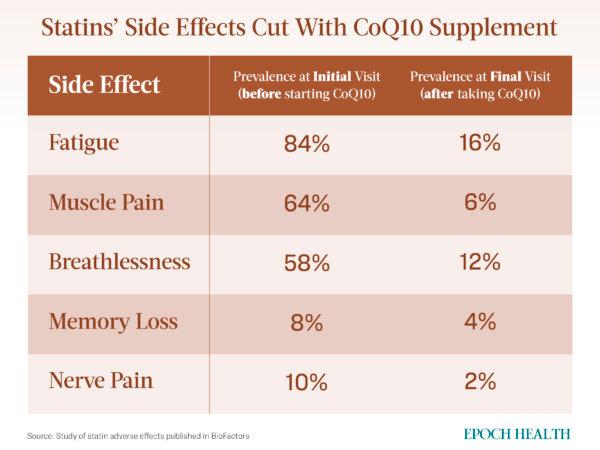Long-Term Use of Statins Linked to Heart Disease: Studies
Statins Deplete Heart-Protecting Nutrients
The review, published in Clinical Pharmacology, suggests that statins may act as “mitochondrial toxins,” impairing muscle function in the heart and blood vessels by depleting coenzyme Q10 (CoQ10), an antioxidant cells use for growth and maintenance. Multiple studies show that statins inhibit CoQ10 synthesis, leading many patients to supplement.“We believe that many years of statin drug therapy result in the gradual accumulation of mitochondrial DNA damage,” the authors wrote.
Statins Deplete Vitamin K, Raising Heart Calcification Risk
Statins impair the production of vitamin K, an essential vitamin in managing calcification, according to the review. Optimal vitamin K2 intake helps avoid plaque buildup of atherosclerosis—thickening or hardening of the arteries—and keeps calcification risk low.Coronary calcification happens when calcium accumulates in the walls of the coronary arteries, which provide oxygen to the heart. This plaque buildup is a sign of early coronary artery disease, which can block blood flow and trigger a heart attack.
Physicians Overlook Statins as Driver of Heart Failure: Experts
Based on emerging evidence of statins’ potential cardiac downsides, the authors of the new review warned that “physicians in general are not aware that statins can cause heart failure and are clearly not recognizing it.” Although doctors readily diagnose heart failure in statin users, they usually attribute it to factors such as age, high blood pressure, or artery disease.Doctors prescribing cholesterol drugs “cannot ignore the moral responsibility of ‘informed consent,’” the researchers wrote, noting that patients deserve full disclosure of side effects such as cardiovascular disease and heart failure.
With more than 1 million annual heart failure hospitalizations in the United States, the condition is often referred to as an epidemic—and, according to the review, it may be that “statin drug therapy is a major contributing factor.”
Reposted from: https://www.theepochtimes.com/health/long-term-use-of-statins-linked-to-heart-disease-studies-5532644




.png)




Comments
Post a Comment